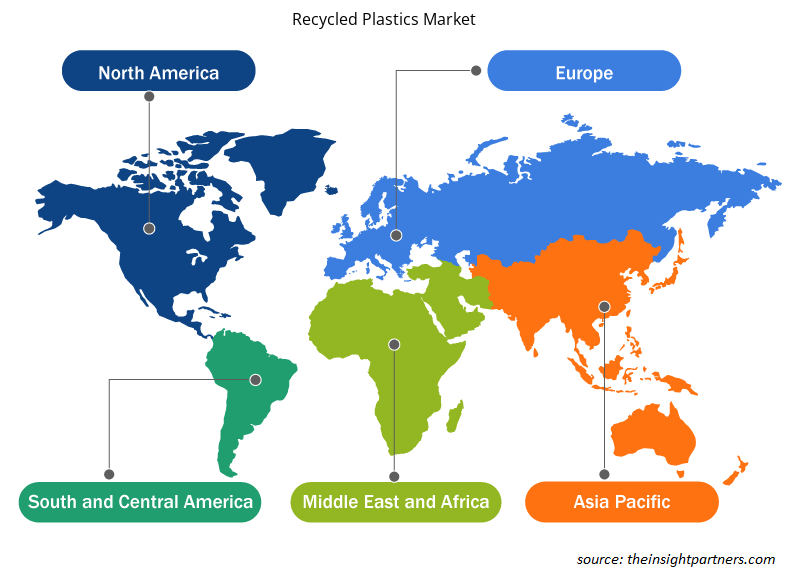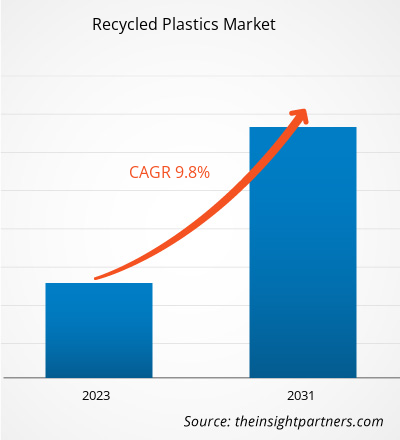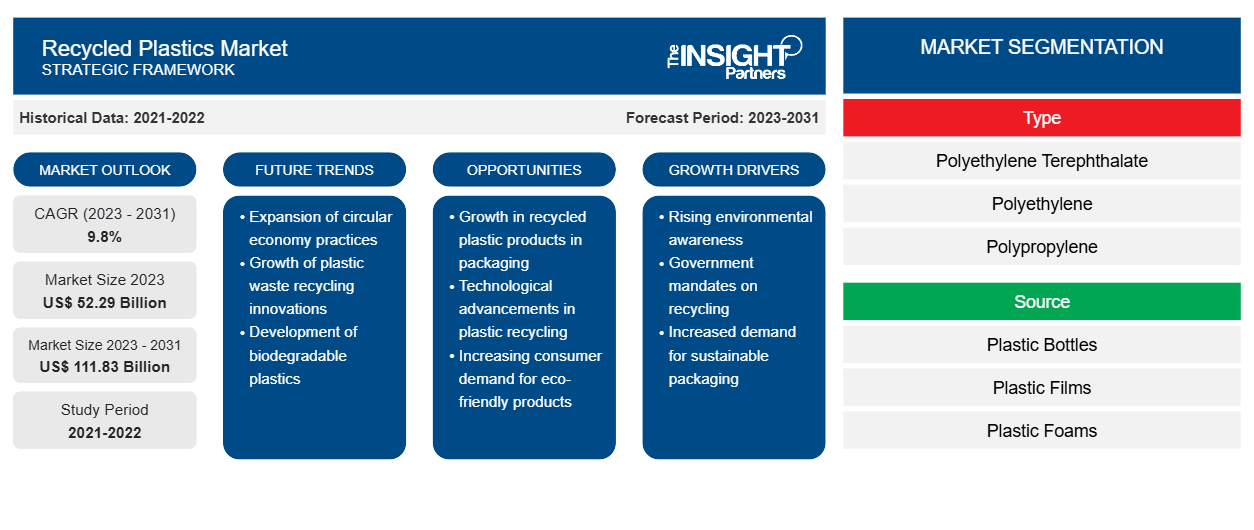再生塑料市场规模预计将从 2023 年的 522.9 亿美元增至 2031 年的 1118.3 亿美元。预计 2023-2031 年该市场的复合年增长率将达到 9.8%。塑料回收领域的不断创新很可能仍是再生塑料市场的主要趋势。
再生塑料市场分析
包装、汽车和电气电子行业的增长是再生塑料的主要推动力。由于新兴经济体乘用车销量和新车产量的增加,汽车行业正在经历巨大的增长,这推动了市场的增长。汽车公司在仪表板和变速箱等汽车零部件中使用再生塑料。
在汽车中使用再生塑料的主要原因是,用再生塑料制造的部件重量轻,重量更轻的汽车消耗的燃料更少,这也意味着废气排放量更少。此外,与其他塑料相比,塑料部件不易腐蚀,具有灵活性和安全性。
根据国际汽车制造商组织 (OICA) 的数据,美洲国家 2010 年商用车和乘用车产量超过约 1620 万辆,增长超过 23%,2019 年商用车和乘用车产量超过约 2000 万辆。中国汽车行业发展迅速,在全球汽车市场中发挥着越来越重要的作用。此外,根据 OICA 的报告,与 2020 年相比,2021 年汽车行业增长了约 5% 以上。许多在汽车市场运营的公司都在汽车制造业投入巨资,以增加产量和销量。例如,2021 年 7 月,玛鲁蒂铃木印度有限公司宣布在印度哈里亚纳邦的新制造工厂投资 24.2 亿美元。该工厂预计每年生产约 100 万辆。汽车制造业的激增推动了对再生塑料的需求,从而推动了再生塑料市场的发展。
再生塑料市场概况
塑料回收是一种重新利用废料或塑料废物并将其再加工成有用产品的方法。塑料废物已成为严重的环境问题之一,因此塑料回收的重要动机是减少塑料废物并将其再用于工业用途。用于回收的塑料废物来源多种多样,例如瓶子、薄膜、泡沫等。消费者对塑料废物的认识使再生塑料行业获得了发展。此外,食品和饮料以及其他类型包装的需求不断增加,以及汽车行业利用再生塑料制造不同部件是再生塑料市场的主要驱动力。它也大量用于建筑行业,该行业的再生塑料消费量将很快上升。然而,由于再生塑料的成本高于传统的原生塑料,其在新兴国家的采用速度较慢。这一因素可能会在未来几年给再生塑料制造商带来重大挑战。
定制此报告以满足您的需求
您可以免费定制任何报告,包括本报告的部分内容、国家级分析、Excel 数据包,以及为初创企业和大学提供优惠和折扣
- 获取此报告的关键市场趋势。这个免费样品将包括数据分析,从市场趋势到估计和预测。
再生塑料市场的驱动因素和机遇
建筑业扩张势头强劲 市场前景看好
随着全球人口的不断增长,快速的城市化进程推动了建筑行业对再生塑料的需求。收入稳步增长可归因于印度和中国等亚太地区国家人口的增长以及对住宅和商业基础设施及项目的需求不断增长。人们对碳足迹更低、绿地更环保的住宅的需求不断增长,这也促进了再生塑料的增长。此外,屋顶是任何建筑物的重要组成部分,安装需要大量资金。再生塑料用于建造屋顶,比其他建筑材料便宜。政府增加支出和投资以改善国内基础设施,并维持建筑行业再生塑料的经济增长,尤其是在发展中国家,是推动市场增长的主要因素之一。
政府法规严格提高塑料回收率,带来巨大增长机会
再生塑料是通过重复使用废旧塑料产品而制成的树脂。此外,再生塑料是通过回收塑料废料和其他废物,然后将其再加工成有用产品而生产的。此外,由于人们对环境的认识不断提高,塑料回收业的发展也正在加速。产生的塑料废物不可生物降解,处理它们的唯一方法是回收再利用。许多组织正在招募公司在其制造工厂中选择再生塑料。例如,美国塑料回收商协会招募了沃尔玛、可口可乐和联合利华等公司。日益增长的环境问题以及对节能框架的需求,加上多功能适用性,支持许多地区严格的政府法规。
再生塑料市场报告细分分析
有助于再生塑料市场分析的关键部分是类型、来源、应用和地理位置。
- 根据类型,再生塑料市场分为聚对苯二甲酸乙二醇酯、聚乙烯、聚丙烯、聚苯乙烯等。聚对苯二甲酸乙二醇酯部分在 2023 年占据了更大的市场份额。聚对苯二甲酸乙二醇酯是最广泛使用的塑料;它透明、坚固、轻便且 100% 可回收。聚乙烯再生塑料可以通过回收代码#1 来识别;由于它们的寿命短,因此很容易回收。低扩散系数使聚对苯二甲酸乙二醇酯比其他塑料材料更适合生产塑料瓶、容器等。使用后的聚对苯二甲酸乙二醇酯塑料通过一系列特殊的清洗工艺或化学处理进行收集和加工,以将聚对苯二甲酸乙二醇酯分解成其原材料或中间体,进一步用于生产再生的聚对苯二甲酸乙二醇酯薄片。由于包装食品和饮料需求增加,聚对苯二甲酸乙二醇酯用于食品包装和装瓶应用。
- 根据应用,再生塑料市场细分为包装、纺织、汽车、建筑和施工、电气和电子等。包装部门在 2023 年占据了更大的市场份额。预计在预测期内,包装再生塑料的市场需求将大幅增长。食品和饮料、药品以及个人和家庭护理等快速增长的关键应用行业推动了对再生塑料的需求。再生塑料具有灵活性、刚性、透明性和重量轻的特点。此外,再生塑料包装可以在极端环境下生存,在极端温度下不会降解,从而保持食品和饮料等产品的完整性。这些因素正在推动包装部门的增长。
再生塑料市场份额按地区分析
再生塑料市场报告的地理范围主要分为五个地区:北美、亚太、欧洲、中东和非洲以及南美/南美和中美洲。 2023 年,亚太地区再生塑料市场占有最大的市场份额。许多亚太地区国家,例如中国和印度,是世界上人口增长最快的国家。随着人口的增长,亚太地区的汽车、包装和建筑行业正在迅速发展。包装印刷行业因其广泛的应用范围而在亚太地区不断扩大。中国、印度、日本和韩国等国家拥有食品和饮料以及消费电子产品等成熟行业,这增加了该地区对包装解决方案的需求。由于包装行业的快速发展、食品零售业的增长以及整个地区消费者对可持续包装解决方案的认识不断提高,整个亚太地区的再生塑料包装市场都见证了显着增长。
再生塑料市场区域洞察
Insight Partners 的分析师已详尽解释了预测期内影响再生塑料市场的区域趋势和因素。本节还讨论了北美、欧洲、亚太地区、中东和非洲以及南美和中美洲的再生塑料市场细分和地理位置。

- 获取再生塑料市场的区域特定数据
再生塑料市场报告范围
| 报告属性 | 细节 |
|---|---|
| 2023 年的市场规模 | 522.9亿美元 |
| 2031 年市场规模 | 1118.3亿美元 |
| 全球复合年增长率(2023 - 2031) | 9.8% |
| 史料 | 2021-2022 |
| 预测期 | 2023-2031 |
| 涵盖的领域 | 按类型
|
| 覆盖地区和国家 | 北美
|
| 市场领导者和主要公司简介 |
|
再生塑料市场参与者密度:了解其对业务动态的影响
再生塑料市场正在快速增长,这得益于终端用户需求的不断增长,而这些需求又源于消费者偏好的不断变化、技术进步以及对产品优势的认识不断提高等因素。随着需求的增加,企业正在扩大其产品范围,进行创新以满足消费者的需求,并利用新兴趋势,从而进一步推动市场增长。
市场参与者密度是指在特定市场或行业内运营的企业或公司的分布情况。它表明在给定市场空间中,相对于其规模或总市场价值,有多少竞争对手(市场参与者)存在。
在再生塑料市场运营的主要公司有:
- REMONDIS SE和Co.KG
- 比法
- Stericycle 公司
- 威立雅
- 杰普拉斯
- 阿尔佩克 SAB CV
免责声明:上面列出的公司没有按照任何特定顺序排列。

- 了解再生塑料市场的主要参与者概况
再生塑料市场新闻及最新发展
通过收集主要和次要研究后的定性和定量数据来评估再生塑料市场,其中包括重要的公司出版物、协会数据和数据库。以下是言语和语言障碍市场的发展和策略列表:
- BIFFA 已完成一项价值 1000 万英镑的交易,收购苏格兰唯一的消费后塑料回收设施 (PRF)。该设施位于格兰杰茅斯,之前由 Green Circle Polymers Ltd (GCP) 所有。它是英国最大的 PRF 之一,每年处理约 50,000 吨塑料,将其转化为新的再生塑料材料。(来源:Biffa,新闻稿/公司网站/时事通讯,2020 年)
- 为了减少化妆品包装的碳足迹,威立雅和欧莱雅联手打造塑料循环经济:威立雅将向全球欧莱雅提供高品质再生塑料,与标准瓶相比,可避免 50% 至 70% 的二氧化碳排放。(来源:威立雅,新闻稿/公司网站/通讯,2023 年)
再生塑料市场报告内容和交付成果
“再生塑料市场规模和预测(2021-2031)”报告对以下领域进行了详细的市场分析:
- 范围内涵盖的所有主要细分市场的全球、区域和国家层面的市场规模和预测
- 市场动态,如驱动因素、限制因素和关键机遇
- 未来主要趋势
- 详细的 PEST/波特五力分析和 SWOT 分析
- 全球和区域市场分析涵盖关键市场趋势、主要参与者、法规和最新市场发展
- 行业格局和竞争分析,涵盖市场集中度、热点图分析、知名参与者和最新发展
- 详细的公司简介
- 历史分析(2 年)、基准年、预测(7 年)及复合年增长率
- PEST和SWOT分析
- 市场规模、价值/数量 - 全球、区域、国家
- 行业和竞争格局
- Excel 数据集
近期报告
相关报告
客户评价
购买理由
- 明智的决策
- 了解市场动态
- 竞争分析
- 客户洞察
- 市场预测
- 风险规避
- 战略规划
- 投资论证
- 识别新兴市场
- 优化营销策略
- 提升运营效率
- 顺应监管趋势





















 获取免费样品 - 再生塑料市场
获取免费样品 - 再生塑料市场